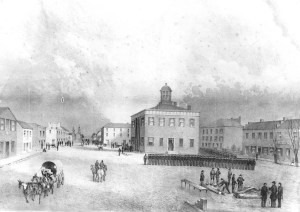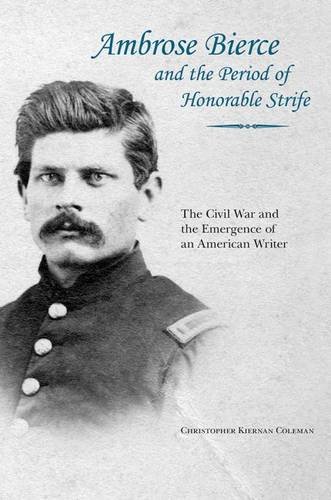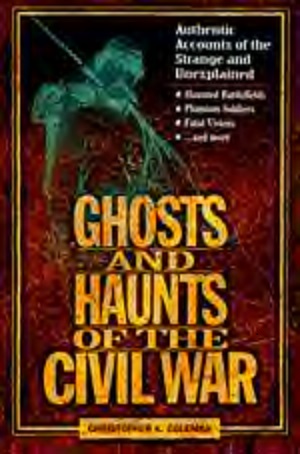
December 25, 1861. It was, by any standards, a hectic day in the Lincoln White House. Mary was all in a tizzy preparing for the dinner-banquet that night, an elaborate formal affair, and the First Lady was abuzz like a Queen Bee seeing to each and every detail–nearly to the point of being bumfuzzled. All three of the Lincoln boys were home for the holidays, including Robert, the eldest, enjoying the seasonal break from his studies at Harvard.
Willie and Tad were up to their usual antics, in contrast to their sedate older brother, and their mother was less able than normal to keep an eye on them. Willie and Tad were a handful on the best of days and today it seemed as though the two partners in crime were more underfoot than average. Both Mary and Abe were doting parents and, in an age when corporal punishment was the norm, many outsiders viewed their sparing the rod a sure-fire path to spoiling the rambunctious pair.

After opening their Yuletide presents, Willie and Tad were packed off to the nearby Taft household, where their excess of energy and talent for finding trouble could be more safely channeled into play with boys close to their own age, leaving Mary free to finalize her plans for the grand soiree she was hosting that evening. Bud and Holly Taft were the offspring of the Chief Examiner in the Patent Office, Horatio N. Taft, and lived off Franklin Square, not far from the White House. On this day their “play” consisted of setting off some rather powerful fireworks and firing real guns loaded with live rounds, military ordinance they’d somehow gotten hold of.
At the White House, meanwhile, there had been an explosive situation–of a political sort–brewing behind the scenes. It was just as well that Mary was absorbed in her preparations for the banquet, for her husband had little time to deal with domestic affairs or holiday preparations. In fact, Lincoln had convened an emergency Cabinet meeting at ten that very morning to discuss an immanent crisis with Great Britain.

On November 8, the USS San Jacinto had stopped an English mail packet, the Trent, traveling between Havana and the British island of St. Thomas in the Caribbean. The American vessel and its sister ships were on the lookout for blockade runners trying to smuggle trade goods out of the Confederacy and weapons and other contraband in. It so happened that the commander of the US naval blockade squadron in the Caribbean, Captain Charles Wilkes, was particularly zealous in pursuit of Secesh smugglers, slavers, privateers and other miscreants who thickly infested the region.
In Havana, Captain Wilkes had gotten wind of a particularly important cargo headed to England: two Secesh agents, bearing secret dispatches for associates and allies abroad. On this day the Federal warship stopped a suspicious craft flying British colors. After two shots across the ship’s bow, Captain Wilkes ordered a boarding party to investigate and discovered two Rebels in civilian clothes, Messrs. Mason and Slidell. The two men were the agents that his informants had warned him of. Although traveling as diplomats, their government had no official standing in international diplomacy; their clear intent was to obtain help for the Rebel cause and to do harm to the US abroad.
The two Confederates were fair game insofar as the United States was concerned. By international law, the San Jacinto should have hauled the Trent into an American port, where a Prize Court would decide their fate. In the routine course of events, a Prize Court would not only have remanded the two subversives into Federal hands, but likely have the ship and its content seized for violating the blockade as well. Instead, the junior officer in charge of boarding party simply removed the two traitors from the British vessel and let the RMS Trent continue on its voyage. The young lieutenant thought to save the navy the bother of sailing the British vessel all the way to Boston; but his change to the standing orders would have unforeseen consequences.
During the Napoleonic Wars, the King George’s Navy had regularly stopped US ships on the high seas on the slightest pretext, arbitrarily kidnapping American seaman to fill their ship’s complement and thought nothing of it; at times them made so bold as to attack US warships on the high seas. The Admiralty had never repented of its imperious ways and whatever their rationale, in truth the English did so because, as the most powerful navy in the world, they could. However, now, when the roles were reversed, Her Majesty’s Government feigned moral outrage.

Lord Palmerston, the British Prime Minister (nicknamed The Mongoose by those who knew him well), whose political party held a majority in Parliament and whose affluent friends also controlled most of the British press, whipped up public sentiment condemning this supposed violation of Britain’s neutrality rights. Although officially neutral with regard to the Secession Crisis in the United States, Palmerston and his minions were anything but neutral in either fact or sentiment. If the truth be told, the Mongoose was eager for a pretext, any pretext, to intervene in favor of the confederated states, whose economic interests aligned closely with that of England.
Although Great Britain had long since outlawed slavery and the slave trade, the American blockade of Southern ports was driving up the cost of cotton –and “King Cotton” was the fundamental raw material of Capitalism, the relatively new economic system upon which both the thriving British and French economies were based.
Beneath all the altruistic rhetoric which British elite might write or say on the subject of slavery, British pundits, politicians and others of the Victorian upper classes cared far more about the condition of their factory owners’ bulging purses than they did for the condition of Negro slaves in America.
The wily Palmerston penned an ultimatum that, unchanged from its original form, would surely have been rejected by the Lincoln Administration and must inevitably lead to war between the States and Britain. Palmerston at the same time made preparations to transfer regiments of foot of Her Majesty’s army to Canada to bolster its long, weakly defended border with the States. War, should it come, would begin there.
The situation was desperate, despite the good offices of American ambassador Charles Francis Adams. The only glimmer of hope lay in the fact that such an ultimatum had first to be approved by Her Majesty, Queen Victoria and her chief advisors. In this instance, Victoria’s advisor was her Royal Consort and much beloved husband, Prince Albert. In truth, neither Queen nor Consort were of like mind with the devious prime minister regarding war with America.
Unfortunately, at the time Prince Albert lay sick abed, desperately ill. Prince Albert, summing all his remaining energy, worked on the Mongoose’s Ultimatum to the US, moderating its tone and making it as palatable to the Lincoln Administration as was possible. It was this softened version of the note that was delivered to Abraham Lincoln by the British minister to Washington.

Prince Albert had done all he could do to prevent war. Nonetheless, if the United States did not hand over Mason and Slidell and render a formal apology, there was little doubt it would mean war between the two countries. Her Majesty’s formal request was not the sort of Christmas missive Lincoln had been looking forward to.
Beginning at ten a.m. on Christmas Day, Lincoln and his Cabinet heatedly debated the British demands and what their response to it should be. Some were for war—a war which the US could not hope to win—others were for complete submission to the terms. The discussion was heated at times and the cabinet meeting dragged on for four hours. The contentious Christmas meeting adjourned without a decision being arrived, much less a response to the British ultimatum. The only thing agreed upon was that they would meet again on the morrow.
We cannot know for certain what transpired that evening which served to ameliorate the impasse that had arisen at the cabinet meeting earlier in the day. The only intervening event was the Christmas Dinner that First Lady Mary had meticulously planned and executed–her first such Christmas banquet in the White House.
We can but speculate what happened between the contentious Cabinet Meeting and the next day’s events. Perhaps it was Mary’s “mid-winter soiree” that evening that mellowed the President–although backwoods lawyer Lincoln was normally ill at ease at such formal events. Perhaps it was the sight of the freshly redecorated White House, gaily bedecked with cheery Christmas decor done to the best of the First Lady’s not inconsiderable skills in interior decorating. Or perhaps it was simply the bounty of good food, spirited music and seasonal cheer that Christmas night which could not but have helped to put all and sundry in a joyously good mood.

Then too, there was the First Lady herself who may have enabled Abe and his team of disputatious advisors to see a way forward. A bayonet charge by the entire Secesh Army would be preferable to dealing with the First Lady when she was ill-tempered or out of sorts. Conversely, there were few who could fail to respond to the First Lady when she turned up her charm and charisma to the utmost. No one—especially not Abraham—could resist her charisma for long. Mary had pulled out all the stops for this party. Not even the snobbiest of the Virginia Swans who formerly dominated Washington society could have criticized the elegance and vivacity of the banquet that evening. Mary had determined that this evening would be a success to rival even the grandest of the antebellum social gatherings, and she was resolved that no one, and nothing, was going to spoil it. And so it came to pass.
What we do know is that next morning, after feasting on richer fare the night before, President Lincoln resolved to “eat humble pie” and give the British what they wanted. After the belabored Cabinet meeting of the day before, the gathering on the 26th was surprisingly brief. Mason and Slidell, the Confederate “diplomats,” would be remanded into British custody, but the US would not admit any wrongdoing.
Although Captain Wilkes of the USS Jacinto had performed his duties ably and well, the Lincoln Administration chose to frame his actions as though he had not followed orders.
That Christmas of 1861, if not exactly goodwill to all men, at least peace on earth prevailed between the two nations. We may at least partly credit the actions of two spouses: one the Prince Consort, the other the First Lady, for preventing a war.
For esoteric aspects of Abraham Lincoln and his presidency, see The Paranormal Presidency of Abraham Lincoln. For those to whom the Long Shadows of the War still cast shade upon their souls, Ghost and Haunts of the Civil War is also recommended. My latest book on the Late Unpleasantness, Ambrose Bierce and the Period of Honorable Strife, is now out and available at all the better bookstores.








